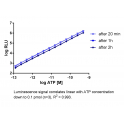Biaffins ATP determination PRO kit is a sensitive bioluminescent assay with an extended signal stability. This assay is optimized for an accurate, sensitive detection of very small amounts of ATP (down to 0.1 pmol) in various samples for up to two hours.
The bioluminescent ATP determination assay includes thermostable firefly luciferase, D-Luciferin as substrate and appropriate buffer solutions optimized for sensitive ATP quantification.
Quantity: 100 ml assay kit for 2000 - 10 000 assays
Frequently Asked Questions (FAQ)
Literature References:
Kricka LJ. (1988) "Clinical and biochemical applications of luciferases and luciferins", Anal Biochem. 175 (1): 14-21
Crouch SP et al. (1993) "The use of ATP bioluminescence as a measure of cell proliferation and cytotoxicity" J Immunol Methods 160(1):81-8
Koop A et al. (1993) "Continuous bioluminescent monitoring of cytoplasmic ATP in single isolated rat hepatocytes during metabolic poisoning" Biochem J. 295 (Pt1):165-70
Sakakibara T et al. (1999) "An enzymatic cycling method using pyruvate orthophosphate dikinase and firefly luciferase for the simultaneous determination of ATP and AMP (RNA)", Anal Biochem. 268(1):94-101
Product Citations of Biaffins ATP determination kit:
Lalitha Tadala, Dorothee Langenbach, Mirjam Dannborg, Ramón Cervantes-Rivera, Atin Sharma, Kevin Vieth, Lisa M Rieckmann, Alkwin Wanders , David A Cisneros, Andrea Puhar, (2022) "Infection-induced membrane ruffling initiates danger and immune signaling via the mechanosensor PIEZO1", Cell Rep, 40 (6), 111173, August 09, 2022
Puhar A, Tronchère H, Payrastre B, Nhieu GT, Sansonetti PJ. (2013) "A Shigella effector dampens inflammation by regulating epithelial release of danger signal ATP through production of the lipid mediator PtdIns5P."
Immunity. 39(6):1121-31.
Lai B, Yu S, Bernhardt PV, Rabaey K, Virdis B, Krömer JO. (2015) "Anoxic metabolism and biochemical production in Pseudomonas putida F1 driven by a bioelectrochemical system." Biotechnol Biofuels. 18;9:39
Surova L, Sherstneva O, Vodeneev V, Katicheva L, Semina M, Sukhov V. (2016) "Variation potential-induced photosynthetic and respiratory changes increase ATP content in pea leaves." J Plant Physiol.202:57-64.
Mewes M, Nedele J, Schelleckes K, Bondareva O, Lenders M, Kusche-Vihrog K, Schnittler HJ, Brand SM, Schmitz B, Brand E. (2017) "Salt-induced Na+/K+-ATPase-α/β expression involves soluble adenylyl cyclase in endothelial cells." Pflugers Arch. 2017 May 26. doi: 10.1007/s00424-017-1999-6.
Kerkman PF, Dernstedt A, Tadala L, Mittler E, Dannborg M, Sundling C, Maleki KT, Tauriainen J, Tuiskunen-Bäck A, Wigren Byström J, Ocaya P, Thunberg T, Jangra RK, Román-Sosa G, Guardado-Calvo P, Rey FA, Klingström J, Chandran K, Puhar A, Ahlm C, Forsell MN. (2021) "Generation of plasma cells and CD27 - IgD - B cells during hantavirus infection is associated with distinct pathological findings." Clin Transl Immunology, 12;10(7):e1313. doi: 10.1002/cti2.1313. eCollection 2021.
Li Wang, Xiuye Liu, Xiaohui Zhou, Fei Gao, Xingxin Li & Xiuli Wang (2022)"Dexmedetomidine Inhibits Parthanatos in Cardiomyocytes and in Aortic Banded Mice by the ROS-Mediated NLRP3 Inflammasome Activation" J Cardiovasc Transl Res. 2022 Nov 21. doi: 10.1007/s12265-022-10340-y. Online ahead of print.
Lalitha Tadala, Dorothee Langenbach, Mirjam Dannborg, Ramón Cervantes-Rivera, Atin Sharma, Kevin Vieth 1, Lisa M Rieckmann, Alkwin Wanders, David A Cisneros, Andrea Puhar (2022) "Infection-induced membrane ruffling initiates danger and immune signaling via the mechanosensor PIEZO1"Cell Rep;40(6):111173. doi: 10.1016/j.celrep.2022.111173.














Follow us